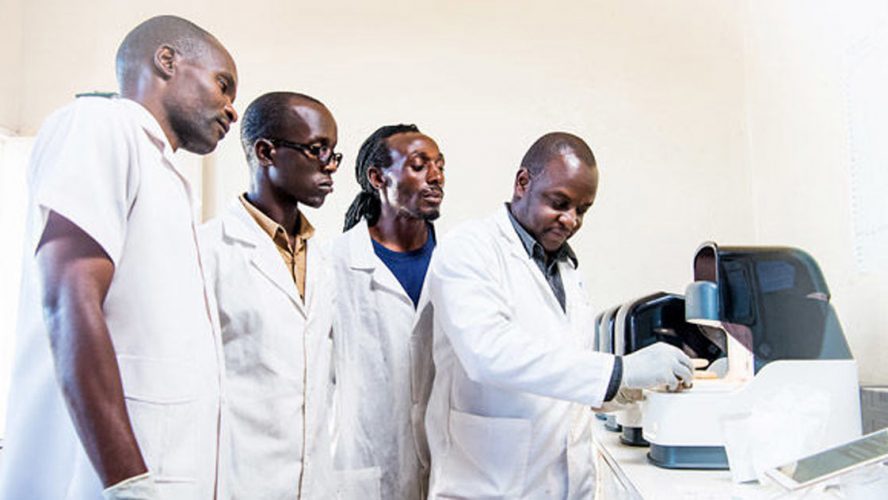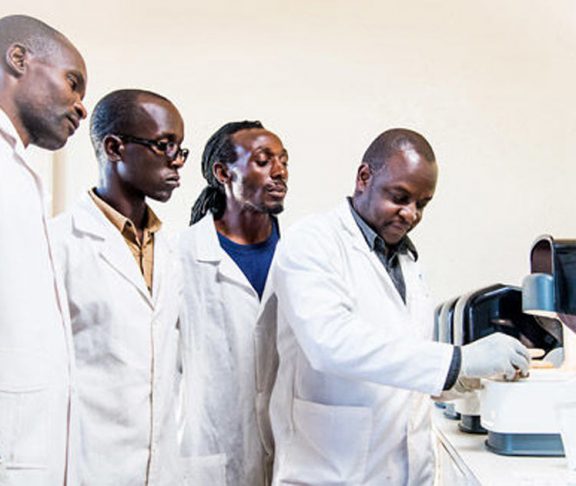Manufactured by Diagnostics for the Real World (DRW), a spinout company from Cambridge University, the new SAMBA II point-of-care machines are specifically developed for resource limited settings.
Zimbabwe is among the first countries in the world to use Samba II point-of-care technology for viral load tests and early infant diagnosis of HIV.
“This new technology has been a game changer in our response to HIV and the treatment strategies. I feel we are winning the battle through sustainable programmes, clinical acumen and the use of advanced technology to monitor patients,” said the medical officer in charge of diagnostic services at Collin Saunders Hospital, Triangle, Zimbabwe, Dr Brian Ziki.
“Before the introduction of these machines, it would take eight weeks or more to get results. Talk of anxiety and delayed management of patients as we waited for results!” “The machines have changed the game; they are allowing us to offer services at the point-of-care and patients get results within hours. So, it has improved care of patients in every sense as it is now literally by the bedside, helping us come up with timely interventions and management of patients according to viral load results,” he added.
Effect on patients
“It has helped us keep most patients on first line treatment through enhanced monitoring and counselling in cases where a patient has been failing clinically. We are not rushing into switching patients to second line treatment before adequate assessment. We have realised that some of the clinical failures were to do with issues of adherence or safe sex practices hence we are taking time to counsel patients,” says Dr Ziki.
Director for laboratory services in the Ministry of Health and Child Care Douglas Mangwanya says, “Previously, with the centralised system, the number of people living with HIV who accessed viral load testing stood at 15% but has now gone up to 70%.
“The Samba II is made for resource-constrained settings and is more reliable, simple, robust, quality-assured and relatively rapid point-of-care molecular diagnostic platform.”
Hauna District Hospital
Before rolling out of the first phase of the decentralisation project, institutions – such as Hauna district hospital in Manicaland – would send their blood samples to a centralised laboratory where it could take up to three months before results were returned, impacting negatively on treatment outcomes as some clients were lost to follow ups or death. Hauna district medical officer, Dr Caephas Fonte said the process resulted in high volumes of sample rejections, lost samples and ultimately delayed treatment thereby compromising effective HIV management.
Treatment monitoring
A person living with HIV cannot be switched from one drug to another without knowing their viral load status, explains Mr Nyakabau, despite them presenting with opportunistic infections. “We can now, more easily, switch our clients from one drug to another. Once a client walks into our institution, we can quickly check for their viral load level and take necessary intervention immediately,” says Leonard Nyakabau, a nurse and HIV focal person for Hauna district hospital. Previously, they were losing some patients as the disease progressed while awaiting viral load confirmation from a centralised laboratory.
Kwekwe General Hospital
Kwekwe Medical Superintendent, Dr Patricia Mapanda says, “Of course, the technology has made our work much easier and we are grateful. We used to send samples to Gweru and that came with a lot of challenges; chief among them being longer turnaround periods for results. Sometimes results would get lost and we needed to redo the tests all over again.
Now, those challenges have been minimised as we are now able to carry out some of the tests here.” Sister Miranzi said, before the Samba II technology, it would take them close to six weeks before receiving results, delaying intervention and
increasing chances of babies being infected.
A laboratory scientist at Kwekwe General Hospital, Mr Stanford Mjanga, said the Samba II point-of-care technology had made his work much easier as the machines were easy to use and allowed him to multitask. “You don’t need to spend time monitoring the machine. In 70 minutes, you will get your results, which is convenient for me, the nurses and the patients.”
Pregnant women and diagnosis of infants
Babies born to HIV-positive mothers need to be tested at birth and immediately initiated on anti-retroviral drugs should they test positive, otherwise 50% die by their second birthday. Dr Ziki says they are prioritising viral load check on pregnant mothers to reduce infection. “Good viral suppression can help reduce transmission to the unborn baby.”

